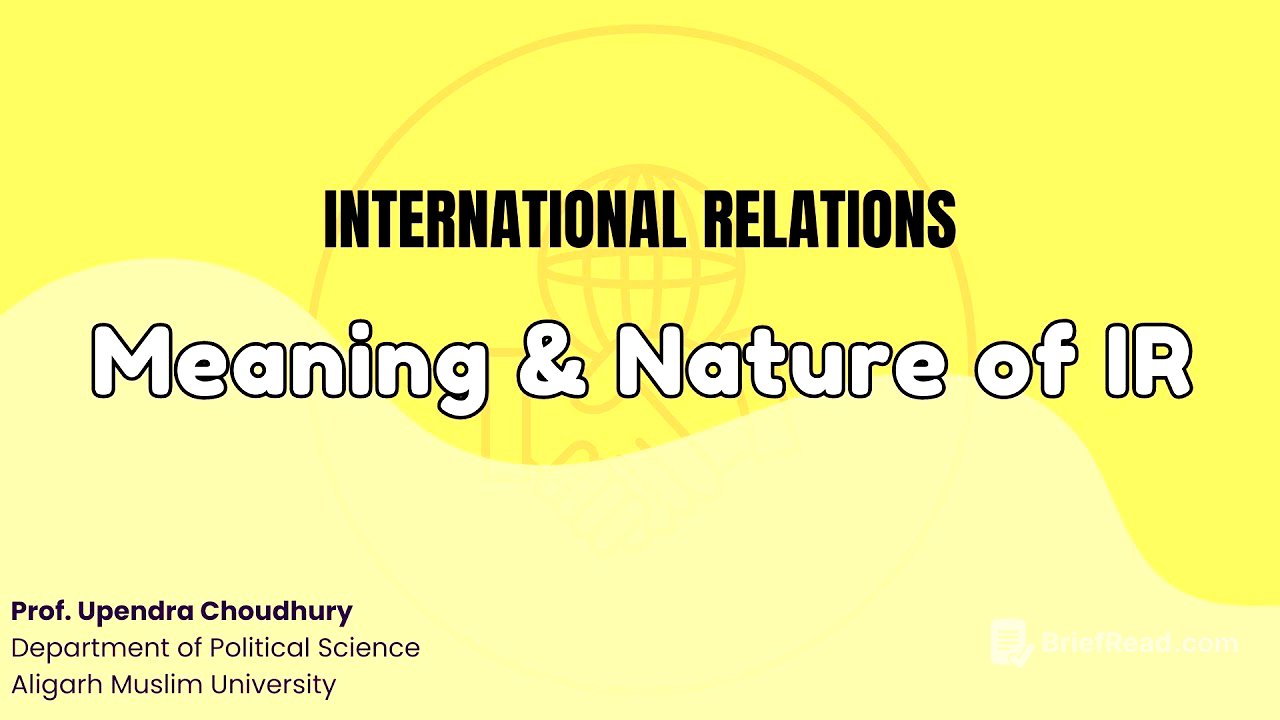TLDR;
This lecture discusses the meaning and nature of international relations, addressing the difficulties in defining the discipline due to its dynamic nature and evolving scope. It explores how international relations is understood as both a subject and an object, examining narrow, broad, and current views. The lecture also investigates whether international relations is a subfield of political science or an autonomous discipline, considering arguments for both perspectives.
- Defining international relations is challenging due to its dynamic nature and evolving scope.
- The discipline is understood differently through narrow, broad, and current views.
- The debate continues whether international relations is a subfield of political science or an autonomous discipline.
Difficulties in Defining International Relations [0:15]
Defining international relations is difficult because it is a dynamic discipline with a constantly evolving nature and scope. The terms "international politics," "international relations," and "global politics" are used interchangeably without a consensus on their meanings. The global community's rapid changes, exemplified by unexpected events like the COVID-19 pandemic and geopolitical conflicts, further complicate defining the discipline. Scholars often focus on the essence of the subject rather than its specific areas of inquiry, adding to the definitional challenges. The relative newness of international relations as a discipline also contributes to these difficulties, as even older social sciences like history and political science continue to refine their definitions.
Understanding International Relations as Subject and Object [4:50]
International relations can be understood both as a subject (the academic discipline) and an object (the phenomena studied). The academic subject, denoted with capital letters (International Relations), is distinct from the phenomena of international relations, denoted in lowercase. The capitalized form refers to the study of international relations, while the lowercase form describes the actual events, actors, and institutions on a global scale. For example, attending an "international relations" class refers to the discipline, while studying "international relations" within that class involves examining the object of the discipline, including theories, concepts, and issues.
Narrow View: International Politics [6:37]
The narrow view of international relations, often referred to as "international politics," primarily focuses on the analysis of relations between nation-states. This perspective, prominent until the 1950s, emphasizes the political interactions among states, particularly the competitive and confrontational aspects. Scholars like Hans Morgenthau, a key proponent of this view, saw international politics as a struggle for power among nations. Definitions from this perspective highlight elements of opposition, resistance, or conflict of interest among independent political communities, with a focus on states adjusting their national interests in relation to others.
Broad View: International Relations [9:49]
The broad view of international relations encompasses all relevant contents and relationships, extending beyond political interactions to include economic, scientific, and cultural aspects. This perspective covers both conflictual and cooperative relationships, friendly and unfriendly interactions, and power dynamics alongside peaceful relations. It addresses a wide range of human experiences, from cooperation and respect to hatred and war, examining the causes of conflict and the possibilities for peace. Scholars adopting this view focus on the external policies and power of states, while also recognizing the importance of non-state actors and their influence on interactions among major groups.
Current View: Global Society [13:37]
The current view contrasts the traditional state-centric approach with a focus on global society, emphasizing the interconnectedness of various actors and processes. While states remain important, this perspective recognizes the significance of cross-border activities by individuals, social groups, and international organizations. Key actors include transnational corporations, non-governmental organizations, global social movements, and supranational entities like the European Union. The world is seen as a formal anarchy where states retain considerable power, but the international structure is also shaped by material and normative elements, with global politics influenced by a variety of actors and forces beyond just states.
Nature of International Relations: Subdiscipline or Autonomous Discipline? [18:49]
The nature of international relations is debated, with some viewing it as an interdisciplinary field or a subdiscipline of political science, while others argue for its autonomous disciplinary status. Those who see it as interdisciplinary emphasize its reliance on other social sciences and the lack of unique subject matter. Others consider it a subdiscipline of political science due to the intertwined nature of domestic and foreign policy, the shared analysis of phenomena like state power, and the use of similar research methods. However, proponents of international relations as an autonomous discipline argue that it has developed a systematic body of theory, appropriate methodology, and distinct subject matter, reducing its dependence on other fields. The increasing establishment of separate international relations departments in universities reflects its emergence as a distinct academic study with a professional identity.









